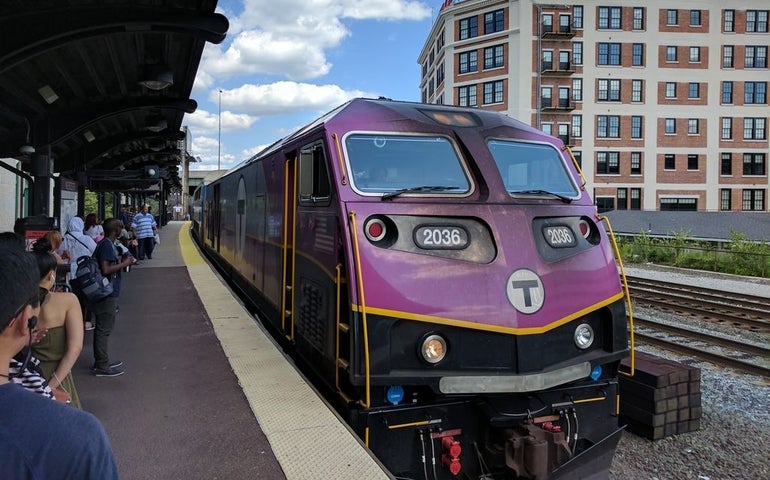Massachusetts faces an $8.4 billion shortfall in revenues needed to ensure that state roads and bridges and MBTA infrastructure are in a state of good repair over the next ten years, according to a new report, which calls on the state to agree on an updated reform and revenue plan for the next decade and beyond.
A Better City, a group of business leaders focused on the Boston region’s economic health and competitiveness, concluded in its 80-page report that the funding shortfall at the MBTA between 2019 and 2028 is $1.9 billion while the biggest gap, $6.5 million, is at MassHighway, which is responsible for state roads and bridges.
The projected funding gap does not account for the lack of funding committed to popular expansion projects, including commuter rail to the South Coast, the Allston Interchange project, an east-west high speed rail service, expansion of South Station, the North-South Rail Link, the Red-Blue Line Connector, Southeast Expressway capacity improvements, Cape Cod Canal transportation plans, and expanded water transportation.
With support from the University of Massachusetts Donahue Institute, the report was put together by A Better City project staff Tom Ryan and Kathryn Carlson, with consulting provided by Marc Cutler and outside advisors Terry Regan, Steve Silveira, and Mike Widmer, the former president of the Massachusetts Taxpayers Foundation.
While lawmakers over the past decade have adopted reforms and new funding sources to bolster transportation, the report concluded that Massachusetts “still has not adequately addressed” the issued raised in a landmark 2007 Transportation Finance Commission report, which Silveira and Widmer helped to assemble.
Massachusetts has fully or partially implemented 20 of 22 reforms recommended by the commission, but while the commission’s reforms came with a cost savings estimate of $2.4 billion over 20 years, the report estimated that savings to date from reforms at just $140 million.
On the revenue front, the report notes the commission made six recommendations designed to raise $19 billion over 20 years, but revenues adopted by the Legislature, including a 3 cents per gallon increase in the gas tax, have “only resulted in approximately half of the projected revenue needed.”
“Continued underfunding of the state’s transportation network diminishes the progress that has been achieved through transportation reforms, improved management practices, and expanded oversight,” the report says, adding that “absent adequate funding” the years ahead will feature increased borrowing, deteriorating service, a drop in state of good repair spending, and further delays of modernization and expansion projects.
Gov. Charlie Baker has pointed to plans to spend $8 billion over the next five years to bolster the MBTA and improve service, and the report describes that spending as a “reason for optimism.”
However, researchers say that the historic funding level is only possible because the Green Line Extension and purchases of new Red and Orange Line vehicles “are largely funded by the Commonwealth’s borrowing or through federal funds.” After 2023, when the projects are completed and one-time sources of funding are spent, the MBTA faces ten more years of increased capital spending and growing deficits if it has to increase its borrowing, the report says.
“The operating budget deficit would reach $142 million in 2024 and more than $300 million in 2028, even when assuming regular fare increases and favorable borrowing conditions,” according to the report.
The state’s highly touted Accelerated Bridge Program, funded through about $3 billion in borrowing, led to a significant decline in structurally deficient bridges, but program borrowing costs are coming due, according to the report, and there’s insufficient funds to address 482 bridges that remain structurally deficient.
The report points to a menu of revenue-raising options to wipe out the gap, such as increasing the gas tax, assessing the sales tax on gas purchases, a regional carbon pricing program for transportation, border tolls, expanded in-state tolling, increasing current tolls, increasing Registry of Motor Vehicles fees, increasing ride-for-hire fees, and implementing a pricing system to discourage vehicle travel during peak periods.
A vehicle miles traveled fee alone, the report estimates, could raise $8.8 billion over the next decade.
Whether business leaders and groups get behind new revenue proposals, which always face a difficult road in the Legislature due to financial impacts on residents, is an open question.
“The business leaders of A Better City and the major business organizations throughout the state have identified major improvements in the transportation system as their number one priority,” Douglas McGarrah, chairman of A Better City’s Board and partner at Foley Hoag LLP, said in a statement.

